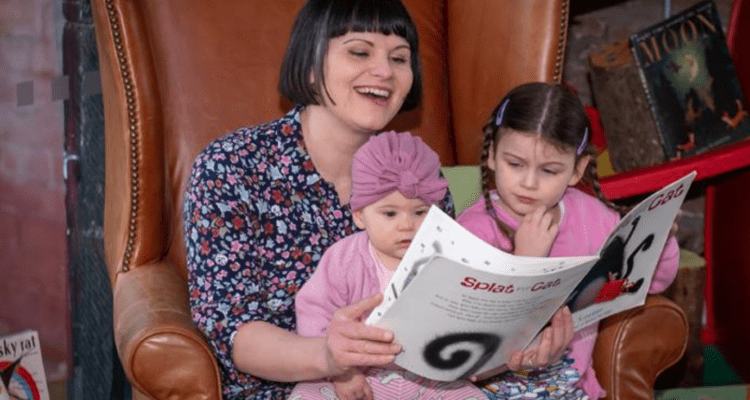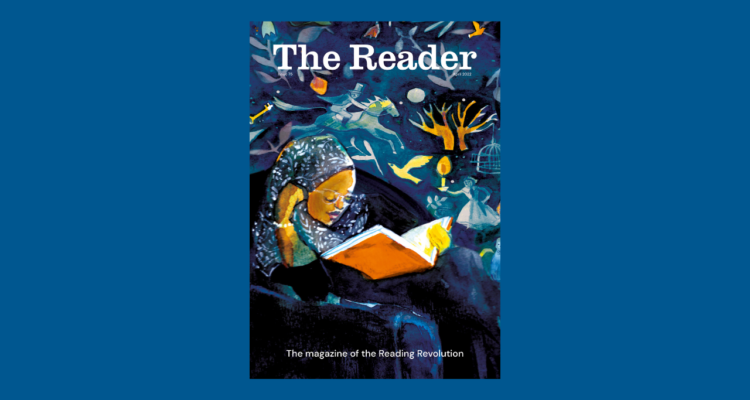The Reader Magazine: Poetry and Shared Reading
In this article from Issue 71 of The Reader Magazine, The Reader's Learning and Quality Leader, Chris Lynn, explores how poetry can move us in ways we might not completely understand.

The Dew Point
I’ve been bringing poetry to shared reading groups for several years, and because of the contexts in which I have read, often it has served the group best to dedicate the whole hour to just one poem. Over time, this has given me a real taste for what poetry can offer in shared reading, whether this be in a care home, a training session with people who are new to one another, or among people with enduring mental health difficulties. But when we are first starting out, or even just sitting down to read together, there can be barriers to overcome.
Poetry has a reputation that can work against us Reader Leaders. In some instances, perhaps after initially reading a story together, group members have got up to leave after catching whiff of a poem (‘I don’t do poetry’, many will say), and its formal standing as high art can unsettle even the most avid of general readers. At The Reader we often read in settings in which resources are stretched and where immediate human needs are palpable, so how can reading poetry aloud help these people, who may be yearning for clarity and clear-cut answers above all else?
It is about rediscovering the multiple and various ways in which as individual sentient beings we can connect to a poem, and then encouraging others to find this out for themselves. Great poetry appeals to the eye, the ear and the heart. But the best stuff usually resists easy definitions and rewards re-readings with an array of fresh meanings. It can yield new perspectives in unexpected ways. It moves us in ways we might not completely understand or be able to put into words. So how does this happen?
The recently appointed poet laureate, Simon Armitage, said that poetry occurs:
‘…when the amount of daylight in a poem (that which is clear) and the amount of night time in a poem (that which must be imagined or figured) correspond…Poetry occurs at the dew point, where difficulty meets understanding, when considered thought condenses into considered language.’
I hold on to his terms ‘daylight’, ‘night time’ and ‘the dew point’ as a way to better illuminate both the unique qualities of poetry and our experience of exploring poetry within a Shared Reading context.
Daylight
Daylight can be thought of in terms of what we can see clearly and understand in a poem. We need this as readers, unmoored at first by the unfamiliar environment of a poem. In a group, Reader Leaders need to protect this daylight, perhaps picking it out by re-reading lines that seem easier to comprehend or imagine, thus simultaneously rooting us and inspiring confidence in the group to tentatively explore the more difficult parts. We might refer to something beyond the poem, a real-life experience or a memory that we can ponder over in this clear light.
‘Life for me ain’t been no crystal stair’, writes Langston Hughes in ‘Mother and Son.’ It’s a line that feels so immediate and direct, but what does this phrase actually bring to mind? What would life be like if it was a ‘crystal stair’? Can we imagine anyone having a life like this?
In a very short extract from ‘A Shropshire Lad’, A.E. Housman writes of ‘the land of lost content’, ‘the happy highways where I went / And cannot come again’. One reader was reminded by these lines of her experience of evacuation during the war, of being taken away to ‘the farms’, and the ‘happy highways’ which were evocative for her not just of a place but of a time that had been, pre-war. ‘Where I went.’
When you connect with a poem you are part of the human conversation, you begin to be seen by yourself, and by others in the group. Shared reading can offer a rare opportunity to care for, or even reconsider, our inner lives. Hearing a poem aloud can be a light which speaks to our deepest, dreamed realities. The daylight also illuminates the world around us, allowing us to see the world and be visible to one another. It can come in the form of truths found in the poem that we recognise like old friends - like warmed skin from the morning sunlight.
‘Here, you talk about things that don't come up in normal conversation. Important, life things.’
Shared Reading group member
In ‘Everything is waiting for you’, David Whyte also reminds us that a poem is an invitation.
Your great mistake is to act the drama
as if you were alone. […]
Put down the weight of your aloneness and ease into
the conversation. The kettle is singing
even as it pours you a drink, the cooking pots
have left their arrogant aloofness and
seen the good in you at last.
Night-time
There will be difficulty or mixed feelings in any poem. This is why even the word ‘poetry’ can intimidate. When encountering the complexities in a poem, there is a risk of making a mistake and appearing foolish to others, the fear of which runs deep in our human psyche. When I bring a poem to a group, I know I will have to work hard to create a positive, even playful mood; to be patient and encouraging; to show that there is permission to be unsure, that it’s okay, and even expected, not to have all the answers. But just as we lift weights when we want to build muscle, it’s vital to foster the ability to sit with difficulty and uncertainty in the groups. Just as there is space for joy and light, there must also be space for darker emotions, night-time thoughts, for the shades of our inner lives. It’s worth taking on the challenge, venturing into the dark.
The experience is unlikely to be disheartening if there are multiple brains working together on a common goal. Shared Reading is always a team effort - one thought sparking off another. The requirement to face the unknown presents an opportunity to reach out to others, to ask for help, and it forces us to be creative. In moments of difficulty we often have no choice but to come up with new ways of seeing and over time, we learn a sort of reading resilience, a trust – in ourselves, the poem and the others in the room – that something will emerge from the fog.
In one group, to which I took ‘Walking Away’ by C. Day Lewis, the first response from one of the readers was: ‘It’s not an easy poem. It’s not a simple poem at all.’ But as we went on to reread it and focus on particular lines, there were parts of the poem that really galvanised the group. A parent describes watching their child play their first game of football, and then move away from them towards the school. ‘Eddying away / Like a winged seed loosened from its parent stem.’ They’re getting ‘their own wings’, said one woman in the group; ‘you’ve got to let them go. That’s the art of being a parent, to let them go.’ ‘Love is proved in the letting go’, reads the last line of the poem. But to describe exactly what is involved emotionally in this process is complex. ‘My world had changed suddenly’, said another woman, recalling the day she had taken her daughter to teacher training college. ‘You can’t explain it really. Will I get over this? Could I make myself accept that she’s not with me any more? Not living with me, or being with me.’ The poem goes on: ‘I have had worse partings, but none that so / Gnaws at my mind still.’
The Dew Point
The dew point is where we might feel anchored, however fleetingly, in understanding. It can take many forms: a reactivated memory, a ‘lost pulse of feeling’, a sense of belonging, a new perspective, a feeling of being connected and ‘in the moment’, a recognition of some truth. The dew point is when the universal is put in terms of the personal and rings true.
‘It’s surprising what comes up and what you talk about. It’s like mining personal experiences.’
Shared Reading group member
Importantly, what we take from a poem is never prescribed. The groups can give the space to interact with it on our own terms. We do not have to have reach a consensus in our readings and we might not even be able to put it into words. But through re-readings and by listening to the collaborative effort present in the room, we may get to the dew point; that place where the sea meets land at dawn. The creative response that the crafted and careful language of poetry can provoke is the dew point between poem and reader. It’s worth persevering with poetry in a Shared Reading group because it opens up a different kind of space. Goosebumps territory. Savoured moments. Sound advice. Resounding truths. Beauty. Whatever that ‘something’ is behind the words. As a prison officer training to lead a Reader group put it: ‘What we’re learning is that poetry relates to everyone and everything’.
‘When our world-deafen’d ear
Is by the tones of a loved voice caress’d –
A bolt is shot back somewhere in our breast,
And a lost pulse of feeling stirs again.
The eye sinks inward, and the heart lies plain,
And what we mean, we say, and what we
would, we know.’
from ‘The Buried Life’ by Matthew Arnold
Share
Related Articles

Reader Revisited: Reading with Looked-After Children by Grace Frame
We're taking a trip down memory lane and revisiting articles from The Reader Magazine. This article first appeared in issue…

Issue 75 of The Reader Magazine is out now
Issue 75 of The Reader Magazine is out now! Subscribers – keep an eye on your post for the latest…

Issue 74 of The Reader Magazine is out now
The latest edition of The Reader Magazine is ready for you to feast your eyes on! Issue 74 explores…


